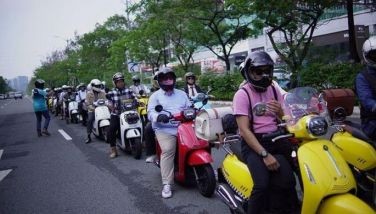Shell's drive to save the Earth
MANILA, Philippines - Based on a recent study, there could be two billion vehicles on the road by 2050. And it’s quite alarming that over the next 40 years alone, the number of vehicles out on the streets today will be twice as many.
No wonder those in the business of designing, building and fueling these vehicles are on a very tedious and determined search for ways on how to produce smarter products resulting to lesser fuel consumption.
Lesser fuel consumption means lesser emission and fossil fuel combustion, a far healthier environment and, with all our fingers crossed, a very gradual but welcome halt to global warming or climate change.
“It’s a global challenge,” said Tan Chong Meng, Shell executive vice president for global business to business and lubricants, during the recent Shell Eco-Marathon at the Sepang F1 Circuit in Kuala Lumpur.
It’s never too late to make the move.
“It may sound illogical to ask people to use lesser of our products but it’s the wise thing to do,” he told a pack of local and foreign journalists who witnessed the annual school-based event.
“Two billion cars on the road by 2050?” Tan asked his audience.
The Shell executive also took notice of a study by the International Energy Agency that in Southeast Asia, the number of vehicles could grow thrice to 92 million by 2030, and that’s just 20 years from now.
“We need to look at three things. One, there’s a growing demand for energy and mobility, and its growing rapidly. Two, the access to fuel energy is getting harder and harder. And three, climate change,” he added.
The ranking official of the leading petroleum company said mobility is not just having a car and driving it around, but finding new, alternative ways or on how the fuel in your tank would make you go farther.
There are countless ways, according to Mae Ascan of the Shell Global Solutions. A Filipina fuel scientist based in Kuala Lumpur, she said saving on fuel is quite addictive.
“Once you start saving, the more you want to save,” she said.
Shell has taken the lead in trying to educate the whole world on how to save fuel, and part of the worldwide campaign is on how far one can go on the least amount of fuel.
Here, the Shell Eco-Marathon takes on a very active role.
Since 1939, when a group of Shell scientists working in Illinois waged a friend bet on whose car would go farthest on the least amount of fuel, Shell has kept fuel efficiency on top of its menu.
Through the years, young students representing various colleges and universities worldwide have taken part in the eco-marathon, not a race against time but for the most mileage one could get on a liter of fuel.
For the first time in its history, the Shell Eco-Marathon was held in Asia, and for two more years it’s locked in Malaysia. Each year will only get bigger and better, vowed Anuar Taib, chairman of Shell Malaysia.
Hundreds of students took part in this one. In all, there were 81 teams from 10 Asian countries, with the Philippines represented by the Mapua Institute of Technology, University of Santo Tomas and Don Bosco Technical College.
For three days, the competition was tough, and friendly, as the students from opposing teams mingled, and shared the technical knowledge on designing and building an entry better than the rest.
In the Shell Eco-Marathon, you can find students from another country bending over, watching their counterparts work on their entry, sharing ideas for a common goal, which is effective fuel efficiency.
On the side, Shell also staged the “Smartest Driver Challenge” where more than a dozen qualifiers from the different Asian countries went for the most kilometers on one liter of fuel on a Honda Civic.
The cars being used in the eco-marathon are designed and built for high fuel efficiency, futuristic and not for everyday use, prototypes weighing no less than 50 kilograms.
It wasn’t a race against time, and the entries only go as fast as 32 km/h. All they needed was to complete four laps, and whatever is left of their fuel is measured, until the last drop, and the car’s fuel efficiency is calculated and determined.
A team from Thailand, with an entry minus all the frills, topped the competition with 1,521.9 kilometers on one liter of fuel, followed by one from Japan at 1,235.1 kilometers, and then China with 940.4 kilometers.
Mapua had its best run of 241 km to finish ninth in a field of 21, followed by Santo Tomas with 198 and Don Bosco with 141.5. For these Filipino students, the brightest in the field of engineering,
“We’re happy with what we’ve achieved here,” said Tim Mervin Orille of UST.
“Because it further opened our minds. The other teams are just far better and like us, they’re still very enthusiastic. I think we’re right in the middle here, better than some, and some are better than us.”
Mapua’s Jericho Paolo Rivera said it doesn’t end here in Sepang because everything is a learning process.
“We’re still learning. That’s why we’re here,” he said.
Besides, it’s not really the race that drew them to this year’s Shell Eco-Marathon, but being part of the global challenge of fuel efficiency, and the search for a healthier environment.
- Latest

























